Moitrayee Bhaduri's Blog, page 2
August 20, 2018
Weaving Subplots in a Crime Thriller
 Writing a crime thriller is a lot of fun but it requires a great deal of planning. I have always admired authors who are able to churn out a book or two every year! It seems like a daunting task and those who can deliver engaging content consistently, are master storytellers. Classics penned by legends like Sir Arthur Conan Doyle, Agatha Christie, Edgar Allan Poe, Patricia Highsmith, Satyajit Ray, Sharadindu Bandopadhyay, and G.K Chesterton among others, never lose their charm. Not just the main plot, the subplots embedded in the narrative make the novels timeless.
Writing a crime thriller is a lot of fun but it requires a great deal of planning. I have always admired authors who are able to churn out a book or two every year! It seems like a daunting task and those who can deliver engaging content consistently, are master storytellers. Classics penned by legends like Sir Arthur Conan Doyle, Agatha Christie, Edgar Allan Poe, Patricia Highsmith, Satyajit Ray, Sharadindu Bandopadhyay, and G.K Chesterton among others, never lose their charm. Not just the main plot, the subplots embedded in the narrative make the novels timeless. The hook A crime writer needs to hook the readers with a fast-paced and persuasive first chapter. In today’s digital age when people have so many distractions at their fingertips, a well-written, action-packed ‘beginning’ is essential to keep the reader engaged.
Subplots Once the basic setting has been created, it is important to weave in subplots to the main story. The sub-stories should always take the main narrative forward and not be mere fillers. For instance, if I have described a flower pot’s movement from the garden to the bedroom in chapter 1, a later chapter should justify why that was done. Subplots enable authors to build characters, establish motives for committing a crime, and engage readers.
Creating conflictsOnce the characters start talking to one another, there are conflicts. Stories help create conflicts and add intrigue. Readers often judge characters based on how they interact with each other. It is important to avoid stereotypes. Original characters stand out, even if they are weird and not likeable.
Twists and surprisesComplex story-threads allow the author to introduce twists that can add suspense and surprise the reader. Through a story twist, a character that your reader loved so long can become a villain. Once the reader starts abhorring this character, the author might add another twist justifying the character’s action. Readers sometimes end up empathising with characters they dislike.
Show, don’t tellWhen we have subplots in the story, it is easier to establish personality traits of the key characters. We don’t need to write sentences like ‘He was an angry, young man’ when the emotion can be established with a sub-story.
Point of viewStories help the author establish a point-of-view for the novel. The main protagonist who can be a detective or a law enforcement official usually unties the knots created through subplots using a point-of-view. Stories enable readers to deep-dive into the mind of the detective and connect the dots.
Nail-biting finishIf the stories within the main plot are edgy, the author can create a surprise ending, especially in a whodunit. Readers like me, who are addicted to crime-fiction, enjoy solving the case along with the fictional detective. Complex stories entwined with the main plot help authors avoid predictable endings.
To sum upWhile the plot is all important, subplots make the narrative gripping and unputdownable. Stories ring in variety. A thriller cannot be boring nor can it have suspense on every page. So, the build-up to the suspense must be exciting. Stories make that possible.
Published on August 20, 2018 02:30
July 7, 2016
Romancing the Rains...
 What is it about the rains that makes a pluviophile's heart go a flutter?
What is it about the rains that makes a pluviophile's heart go a flutter? Is it the first raindrop that lands on your head unawares till your fingers that were carelessly combing your unruly hair discover it prompting an impromptu giggle?
Is it the uncanny godliness of the fresh-earth smell that bowls you over?
Could it be the damp nose of your dog that feels drier but cooler and more lovable than usual?
Is it the shorty drizzle or the longish, plump droplets that travel faster than your shamelessly stark ogle and reach the ground?
Is it that heart-skips-a-beat feeling that brings back fond memories of your first brush with romance?
It could be a million things, or more.
I feel it is more about 'romancing the rains' rather than 'romancing in the rains'. It is like falling in love with the idea of love, not with a specific person. But then the person, even if imaginary, would be a welcome treat!
A perfect rainy day is one that allows you to laze in your den with your favorite murder-mystery, a hot cup of coffee, and your dog curled up next to you. You can listen to the sound of the rains and appreciate the magnificence from your window or balcony. And of course, you have a soulful 'raga' playing in the background. It could also be a 'ghazal' or a 'soft romantic' Arijit Singh number. Total bliss.
The perfect rainy day could also be one when you are by the sea -either at the beach or in a café, gazing at the beauty unfolding in front of your eyes. All you do is appreciate what you witness and immerse yourself in that unrestrained love.
Ah well... a perfect rainy day could also be one which brings old friends or family together - a chance encounter perhaps.
As your mind wonders and wanders, enjoy romancing the rains :)
Published on July 07, 2016 07:13
June 30, 2016
How hard-hitting are betrayals?
No, I am not talking about betrayals in love. How often have you been cheated by friends? Or is that also ‘cool’ these days? Regardless of how we look at it, I am sure most of us have tasted deceit in friendship at least once in life.
 Sensible people don’t waste time thinking about it. They cut off the disloyal person from their life and move on. Sensitive people sulk, write blogs, and waste a lot of time before finally accepting the fact that they have been fooled.
Sensible people don’t waste time thinking about it. They cut off the disloyal person from their life and move on. Sensitive people sulk, write blogs, and waste a lot of time before finally accepting the fact that they have been fooled.
I don’t know if I would characterize myself as sensible or sensitive. Perhaps it depends on the person and your relationship with him/her. Some betrayals make you feel bad but you ignore them as they don’t matter. Others might leave you angry, upset, irritated, or shocked.
The worst kind of betrayal is that which comes from someone who has mastered the art of pretence. You will be ignorant of the skilful way the ‘friend’ will extract information from you and use it to suit their interests. While you trust the person in good faith, you will have no clue what they are up to behind your back!
The reveal will shock you and the puzzle will look impossible. When you see your friend enjoying the exact opposite things they swore to you they abhor, don’t be surprised. This is just the beginning. You will soon find them hanging out with the people they said were in their ‘hate’ list.
Then you need to stir your memory bank a bit so as to allow it to replay some incidents that had irked you when they had occurred. For instance, once upon a time, this person had relentlessly cajoled you to badmouth people they claimed they hated (the same people they have befriended now)! You thank God now that you had refused to utter anything negative back then.
If that is not enough, your so-called friend will try to sweet-talk you into something again, unaware that his/her true colours have been revealed to you. If you ignore, s/he will sever ties with you and make it look like you broke the bond!
Be patient. Your puzzle pieces will come together.
So, next time before you make the statement - “My friend XYZ can never do that,” think again. As the saying goes: “Never say never.”
 Sensible people don’t waste time thinking about it. They cut off the disloyal person from their life and move on. Sensitive people sulk, write blogs, and waste a lot of time before finally accepting the fact that they have been fooled.
Sensible people don’t waste time thinking about it. They cut off the disloyal person from their life and move on. Sensitive people sulk, write blogs, and waste a lot of time before finally accepting the fact that they have been fooled. I don’t know if I would characterize myself as sensible or sensitive. Perhaps it depends on the person and your relationship with him/her. Some betrayals make you feel bad but you ignore them as they don’t matter. Others might leave you angry, upset, irritated, or shocked.
The worst kind of betrayal is that which comes from someone who has mastered the art of pretence. You will be ignorant of the skilful way the ‘friend’ will extract information from you and use it to suit their interests. While you trust the person in good faith, you will have no clue what they are up to behind your back!
The reveal will shock you and the puzzle will look impossible. When you see your friend enjoying the exact opposite things they swore to you they abhor, don’t be surprised. This is just the beginning. You will soon find them hanging out with the people they said were in their ‘hate’ list.
Then you need to stir your memory bank a bit so as to allow it to replay some incidents that had irked you when they had occurred. For instance, once upon a time, this person had relentlessly cajoled you to badmouth people they claimed they hated (the same people they have befriended now)! You thank God now that you had refused to utter anything negative back then.
If that is not enough, your so-called friend will try to sweet-talk you into something again, unaware that his/her true colours have been revealed to you. If you ignore, s/he will sever ties with you and make it look like you broke the bond!
Be patient. Your puzzle pieces will come together.
So, next time before you make the statement - “My friend XYZ can never do that,” think again. As the saying goes: “Never say never.”
Published on June 30, 2016 05:46
March 1, 2016
The Challenges of Being 'One Book' Old!
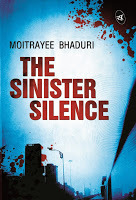 Before my first book
The Sinister Silence
was published (my second isn’t out yet!), my goal was to ‘get published’. Like Arjuna who focused on the ‘bird's eye’ with single-minded resolve, my aim was to get ‘published’. It was a gruelling process and in one of my earlier blog posts, I recounted my
journey from writer to author
.
Before my first book
The Sinister Silence
was published (my second isn’t out yet!), my goal was to ‘get published’. Like Arjuna who focused on the ‘bird's eye’ with single-minded resolve, my aim was to get ‘published’. It was a gruelling process and in one of my earlier blog posts, I recounted my
journey from writer to author
.However like most first-time authors, I realized that once you are published, your challenge has only begun. Here's why!
1. Managing expectations – If people have liked your book, your next book must be even better. It is a writer’s responsibility to challenge herself to come up with a better second book. So, keep writing, come what may!2. Managing distractions – Authors are tempted to google their names, check Amazon rankings every now and then, stay ‘social’ and connect with readers. This may get tiring after a while. Remember: A writer’s mind needs to be fresh so that new ideas can reside there. 3. Keeping up the momentum – A book launch or reading is not enough! You have to keep at it, generate interest among readers in multiple ways all the time!
 4. Online visibility – Thanks to technology, people don’t just buy books from physical bookstores anymore. The online community is overflowing with activity – people buy online all the time. So staying visible online – real-time – becomes important. But a writer can’t always do that. You need to write - remember?5. Book reviews– Getting a professional to review your book is another challenge. The number of authors getting published is increasing every day. Ditto with the number of reviewers. There is also the option of subscribing to 'review packages'. I am not comfortable paying money to get my book reviewed. But then, it works well for some authors, which is good. So those who don’t opt for ‘paid reviews’, don’t get XX number of reviews to showcase on social media. So, you have lost a certain percentage of audience there too!6. Review on Goodreads– Unlike Amazon or Flipkart, the reviews listed at Goodreads are not necessarily from people who have purchased a book through an online store. Anyone with a Goodreads account can randomly rate/review a book. Someone may just dismiss your labour-of-love with a 'one rating' even if they haven't read it! So new authors - please don't lose sleep over reader ratings :). However, Goodreads is a nice place to be for those who love reading and enjoy maintaining reading lists.
4. Online visibility – Thanks to technology, people don’t just buy books from physical bookstores anymore. The online community is overflowing with activity – people buy online all the time. So staying visible online – real-time – becomes important. But a writer can’t always do that. You need to write - remember?5. Book reviews– Getting a professional to review your book is another challenge. The number of authors getting published is increasing every day. Ditto with the number of reviewers. There is also the option of subscribing to 'review packages'. I am not comfortable paying money to get my book reviewed. But then, it works well for some authors, which is good. So those who don’t opt for ‘paid reviews’, don’t get XX number of reviews to showcase on social media. So, you have lost a certain percentage of audience there too!6. Review on Goodreads– Unlike Amazon or Flipkart, the reviews listed at Goodreads are not necessarily from people who have purchased a book through an online store. Anyone with a Goodreads account can randomly rate/review a book. Someone may just dismiss your labour-of-love with a 'one rating' even if they haven't read it! So new authors - please don't lose sleep over reader ratings :). However, Goodreads is a nice place to be for those who love reading and enjoy maintaining reading lists.
 7. Building your brand – Attending book-readings, talks, events etc. and interacting with people to increase your reader-base is important, especially if you are only a-book-old. If events are not possible offline, authors can also organize such events online. The challenge is that you will need to invest a lot of time from your daily schedule for such activities. Rome was not built in a day, you see!8. Active blogging – is important to stay 'alive' in your reader’s mind. The curiosity around the book will die down a few months after the book release. To stay connected with your readers, you need to stay in touch through your writing.9. Time management – This is crucial, especially if you already have a day job. To market your book, schedule promotions, and interact with readers while at your full-time job is no mean feat. Plan your time and time your plan. Set goals with deadlines.
7. Building your brand – Attending book-readings, talks, events etc. and interacting with people to increase your reader-base is important, especially if you are only a-book-old. If events are not possible offline, authors can also organize such events online. The challenge is that you will need to invest a lot of time from your daily schedule for such activities. Rome was not built in a day, you see!8. Active blogging – is important to stay 'alive' in your reader’s mind. The curiosity around the book will die down a few months after the book release. To stay connected with your readers, you need to stay in touch through your writing.9. Time management – This is crucial, especially if you already have a day job. To market your book, schedule promotions, and interact with readers while at your full-time job is no mean feat. Plan your time and time your plan. Set goals with deadlines.
 10. Writing your next book – This is THE most important thing to do if you want to live the life of an author. To seclude yourself and continue writing amid all the distractions, temptations, and book promotions is a tough call. Nevertheless, like Arjuna again – the focus should be unwavering. A writer needs to write - that's the core requirement. That is your true calling.
10. Writing your next book – This is THE most important thing to do if you want to live the life of an author. To seclude yourself and continue writing amid all the distractions, temptations, and book promotions is a tough call. Nevertheless, like Arjuna again – the focus should be unwavering. A writer needs to write - that's the core requirement. That is your true calling.Good luck to all new, old, and aspiring writers! Cheers to your writing journey!
Published on March 01, 2016 08:12
August 20, 2015
Fictional Detectives of the 21st Century
When we think 'fictional detectives', we usually have legends like Sherlock Holmes or Byomkesh Bakshi in mind. Needless to say, we will continue to revere them for centuries to come.
However, in this digital age, is there a new fictional detective who makes your crime-thriller unputdownable? Quite a few names have been gaining popularity in the world of crime fiction since the late 20th century.
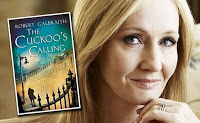 1. Cormoran Strike: Private detective Strike made his debut in Robert Galbraith aka J.K Rowling's ‘The Cuckoo’s Calling’ in 2013 and soon became a popular name among mystery lovers across the world. 'The Silkworm’, where Strike was called upon to investigate the mysterious murder of a novelist was a runaway hit too. His third case - 'A Career of Evil' is slated for an October 2015 release.
1. Cormoran Strike: Private detective Strike made his debut in Robert Galbraith aka J.K Rowling's ‘The Cuckoo’s Calling’ in 2013 and soon became a popular name among mystery lovers across the world. 'The Silkworm’, where Strike was called upon to investigate the mysterious murder of a novelist was a runaway hit too. His third case - 'A Career of Evil' is slated for an October 2015 release.
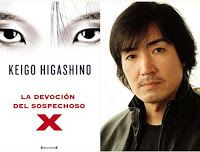
2. Galileo: A Physics Professor with an uncanny ability to crack impossible cases, Detective Galileo was introduced in the brilliant suspense thriller – ‘The Devotion of Suspect X’ (English version published in 2011). Brainchild of the Japanese author Keigo Higashino, the Galileo novels are racy, gripping, and unputdownable.
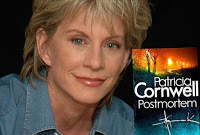 3. Kay Scarpetta: The keenly observant Scarpetta debuted with Patricia Cornwell’s ‘Postmortem’ in 1990. This Italian sleuth started her career as a chief medical examiner and later became a private forensic consultant. ‘The Depraved Heart’ (2015) is the latest Scarpetta novel with cutting-edge forensic investigations.
3. Kay Scarpetta: The keenly observant Scarpetta debuted with Patricia Cornwell’s ‘Postmortem’ in 1990. This Italian sleuth started her career as a chief medical examiner and later became a private forensic consultant. ‘The Depraved Heart’ (2015) is the latest Scarpetta novel with cutting-edge forensic investigations.
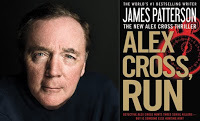 4. Alex Cross – Like Scarpetta, psychologist and Police Detective, Afro-American Alex Cross is also not a new name in the detective world. Introduced in James Patterson’s ‘Along Came a Spider’ in 1993, Cross is highly intelligent, compassionate, and known for his ill luck with women. Watch out for his latest book ‘Hope to Die’ (2015)
4. Alex Cross – Like Scarpetta, psychologist and Police Detective, Afro-American Alex Cross is also not a new name in the detective world. Introduced in James Patterson’s ‘Along Came a Spider’ in 1993, Cross is highly intelligent, compassionate, and known for his ill luck with women. Watch out for his latest book ‘Hope to Die’ (2015)
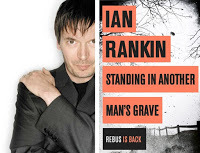 5. John Rebus: Detective Inspector John Rebus is Ian Ranklin’s creation, first seen in ‘Knots and Crosses’ (1987). The unconventional lifestyle and pessimistic attitude added to Rebus’ charm. Though Ranklin announced Rebus’ retirement in ‘Saints of the Shadow Bible’ (2013), the Scottish Inspector continues to be hugely popular.
5. John Rebus: Detective Inspector John Rebus is Ian Ranklin’s creation, first seen in ‘Knots and Crosses’ (1987). The unconventional lifestyle and pessimistic attitude added to Rebus’ charm. Though Ranklin announced Rebus’ retirement in ‘Saints of the Shadow Bible’ (2013), the Scottish Inspector continues to be hugely popular.
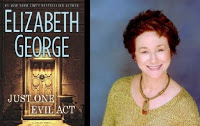 6. Thomas Lynley: Created by the American author Elizabeth George, British detective Inspector Lynley first appeared in 1988 in a novel titled ‘A Great Deliverance’. Several of Lynley’s mysteries were adapted into a TV series. ‘A Banquet of Consequences’ (2015) is the latest addition to the Lynley mystery series.
6. Thomas Lynley: Created by the American author Elizabeth George, British detective Inspector Lynley first appeared in 1988 in a novel titled ‘A Great Deliverance’. Several of Lynley’s mysteries were adapted into a TV series. ‘A Banquet of Consequences’ (2015) is the latest addition to the Lynley mystery series.
7. Mitin Mashi: Created by the versatile Suchitra Bhattacharya, Indian detective Pragya Paromita, better known as Mitin Mashi made her debut in the Bengali novel ‘Palabar Path Nei’. Mitin is a 21st century young, inquisitive detective, who solves complex mysteries along with Tupur, her niece. Some of her super-hit stories like ‘Arakiel Diamond’ have been translated into English. With Bhattacharya’s untimely demise, it is unfortunate that we won’t get to read any new books on Mitin Mashi.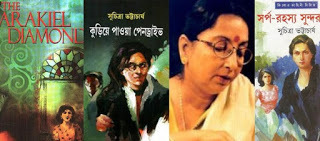
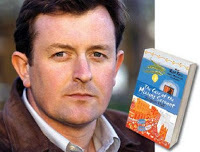 8. Vish Puri: In 2009, English writer Tarquin Hall created Vish Puri, the most private investigator in India. Set in India, ‘The Case of the Missing Servant’ is the first book in the Vish Puri series and establishes our protagonist as an old-fashioned, methodical, and quick-witted Punjabi detective. The other books in the Vish Puri series are equally engaging and have earned critical acclaim.
8. Vish Puri: In 2009, English writer Tarquin Hall created Vish Puri, the most private investigator in India. Set in India, ‘The Case of the Missing Servant’ is the first book in the Vish Puri series and establishes our protagonist as an old-fashioned, methodical, and quick-witted Punjabi detective. The other books in the Vish Puri series are equally engaging and have earned critical acclaim.
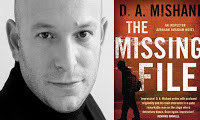 9. Avraham: Crime writer Dror. A Mishani's ‘The Missing File’ (first published in Hebrew in 2011) introduced Israeli Police Inspector Avraham to readers. Exceptional attention to detail and compelling characterization resulted in the growing popularity of the Avraham crime series. ‘The Man Who Wanted to Know’ is Mishani's latest Avraham novel. (The English version will only be available in 2016).
9. Avraham: Crime writer Dror. A Mishani's ‘The Missing File’ (first published in Hebrew in 2011) introduced Israeli Police Inspector Avraham to readers. Exceptional attention to detail and compelling characterization resulted in the growing popularity of the Avraham crime series. ‘The Man Who Wanted to Know’ is Mishani's latest Avraham novel. (The English version will only be available in 2016).
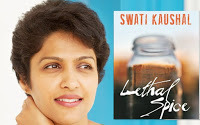 10. Niki Marwah: Indian author Swati Kaushal created the character of Niki Marwah in her crime thriller titled ‘Drop Dead’ (2012). Police Detective Marwah is daring, rebellious, and has featured in two fast-paced murder mysteries until now.
10. Niki Marwah: Indian author Swati Kaushal created the character of Niki Marwah in her crime thriller titled ‘Drop Dead’ (2012). Police Detective Marwah is daring, rebellious, and has featured in two fast-paced murder mysteries until now.
However, in this digital age, is there a new fictional detective who makes your crime-thriller unputdownable? Quite a few names have been gaining popularity in the world of crime fiction since the late 20th century.
 1. Cormoran Strike: Private detective Strike made his debut in Robert Galbraith aka J.K Rowling's ‘The Cuckoo’s Calling’ in 2013 and soon became a popular name among mystery lovers across the world. 'The Silkworm’, where Strike was called upon to investigate the mysterious murder of a novelist was a runaway hit too. His third case - 'A Career of Evil' is slated for an October 2015 release.
1. Cormoran Strike: Private detective Strike made his debut in Robert Galbraith aka J.K Rowling's ‘The Cuckoo’s Calling’ in 2013 and soon became a popular name among mystery lovers across the world. 'The Silkworm’, where Strike was called upon to investigate the mysterious murder of a novelist was a runaway hit too. His third case - 'A Career of Evil' is slated for an October 2015 release.
2. Galileo: A Physics Professor with an uncanny ability to crack impossible cases, Detective Galileo was introduced in the brilliant suspense thriller – ‘The Devotion of Suspect X’ (English version published in 2011). Brainchild of the Japanese author Keigo Higashino, the Galileo novels are racy, gripping, and unputdownable.
 3. Kay Scarpetta: The keenly observant Scarpetta debuted with Patricia Cornwell’s ‘Postmortem’ in 1990. This Italian sleuth started her career as a chief medical examiner and later became a private forensic consultant. ‘The Depraved Heart’ (2015) is the latest Scarpetta novel with cutting-edge forensic investigations.
3. Kay Scarpetta: The keenly observant Scarpetta debuted with Patricia Cornwell’s ‘Postmortem’ in 1990. This Italian sleuth started her career as a chief medical examiner and later became a private forensic consultant. ‘The Depraved Heart’ (2015) is the latest Scarpetta novel with cutting-edge forensic investigations. 4. Alex Cross – Like Scarpetta, psychologist and Police Detective, Afro-American Alex Cross is also not a new name in the detective world. Introduced in James Patterson’s ‘Along Came a Spider’ in 1993, Cross is highly intelligent, compassionate, and known for his ill luck with women. Watch out for his latest book ‘Hope to Die’ (2015)
4. Alex Cross – Like Scarpetta, psychologist and Police Detective, Afro-American Alex Cross is also not a new name in the detective world. Introduced in James Patterson’s ‘Along Came a Spider’ in 1993, Cross is highly intelligent, compassionate, and known for his ill luck with women. Watch out for his latest book ‘Hope to Die’ (2015) 5. John Rebus: Detective Inspector John Rebus is Ian Ranklin’s creation, first seen in ‘Knots and Crosses’ (1987). The unconventional lifestyle and pessimistic attitude added to Rebus’ charm. Though Ranklin announced Rebus’ retirement in ‘Saints of the Shadow Bible’ (2013), the Scottish Inspector continues to be hugely popular.
5. John Rebus: Detective Inspector John Rebus is Ian Ranklin’s creation, first seen in ‘Knots and Crosses’ (1987). The unconventional lifestyle and pessimistic attitude added to Rebus’ charm. Though Ranklin announced Rebus’ retirement in ‘Saints of the Shadow Bible’ (2013), the Scottish Inspector continues to be hugely popular. 6. Thomas Lynley: Created by the American author Elizabeth George, British detective Inspector Lynley first appeared in 1988 in a novel titled ‘A Great Deliverance’. Several of Lynley’s mysteries were adapted into a TV series. ‘A Banquet of Consequences’ (2015) is the latest addition to the Lynley mystery series.
6. Thomas Lynley: Created by the American author Elizabeth George, British detective Inspector Lynley first appeared in 1988 in a novel titled ‘A Great Deliverance’. Several of Lynley’s mysteries were adapted into a TV series. ‘A Banquet of Consequences’ (2015) is the latest addition to the Lynley mystery series.
7. Mitin Mashi: Created by the versatile Suchitra Bhattacharya, Indian detective Pragya Paromita, better known as Mitin Mashi made her debut in the Bengali novel ‘Palabar Path Nei’. Mitin is a 21st century young, inquisitive detective, who solves complex mysteries along with Tupur, her niece. Some of her super-hit stories like ‘Arakiel Diamond’ have been translated into English. With Bhattacharya’s untimely demise, it is unfortunate that we won’t get to read any new books on Mitin Mashi.

 8. Vish Puri: In 2009, English writer Tarquin Hall created Vish Puri, the most private investigator in India. Set in India, ‘The Case of the Missing Servant’ is the first book in the Vish Puri series and establishes our protagonist as an old-fashioned, methodical, and quick-witted Punjabi detective. The other books in the Vish Puri series are equally engaging and have earned critical acclaim.
8. Vish Puri: In 2009, English writer Tarquin Hall created Vish Puri, the most private investigator in India. Set in India, ‘The Case of the Missing Servant’ is the first book in the Vish Puri series and establishes our protagonist as an old-fashioned, methodical, and quick-witted Punjabi detective. The other books in the Vish Puri series are equally engaging and have earned critical acclaim. 9. Avraham: Crime writer Dror. A Mishani's ‘The Missing File’ (first published in Hebrew in 2011) introduced Israeli Police Inspector Avraham to readers. Exceptional attention to detail and compelling characterization resulted in the growing popularity of the Avraham crime series. ‘The Man Who Wanted to Know’ is Mishani's latest Avraham novel. (The English version will only be available in 2016).
9. Avraham: Crime writer Dror. A Mishani's ‘The Missing File’ (first published in Hebrew in 2011) introduced Israeli Police Inspector Avraham to readers. Exceptional attention to detail and compelling characterization resulted in the growing popularity of the Avraham crime series. ‘The Man Who Wanted to Know’ is Mishani's latest Avraham novel. (The English version will only be available in 2016). 10. Niki Marwah: Indian author Swati Kaushal created the character of Niki Marwah in her crime thriller titled ‘Drop Dead’ (2012). Police Detective Marwah is daring, rebellious, and has featured in two fast-paced murder mysteries until now.
10. Niki Marwah: Indian author Swati Kaushal created the character of Niki Marwah in her crime thriller titled ‘Drop Dead’ (2012). Police Detective Marwah is daring, rebellious, and has featured in two fast-paced murder mysteries until now.
Published on August 20, 2015 06:10
June 10, 2015
Writer to Author - A Continuous Journey!
 Baby Steps
Baby StepsWhen I started writing my book The Sinister Silence , I had titled it Silenced. I had intended to write a love story. However, I do not remember exactly when I started to kill some of my characters. At the risk of sounding sadistic, I admit that I enjoyed the process. Soon after, I was writing a murder mystery.
Plot and Characterization
I was happy with my writing – it transported me to a world of my own. I could set my own rules or decide against any, my characters conducted themselves the way I wanted. If they acted up, I let them. As I explored them more, especially my protagonists, I had a better understanding of their expectations from me. I did not need to put everything I knew about them in my book. Nevertheless, getting to know them was a refreshingly novel experience.
 Edit, Edit, Edit
Edit, Edit, EditWhen I finally completed writing, I was thrilled. I started editing my book and in the process, there were several cuts and omissions. I requested my family and a couple of close friends to read the book too. Receiving different perspectives on the same book was a HUGE learning experience. I loved the fact that my characters had behaved differently with different readers J.
Get Published
I knew what the next logical step was - to get published. All that I needed to do was to send my manuscript to publishers. Once selected, I would see my name in print in the following two or three months. Ah - wake up, my inner voice nudged.
 Just the Beginning
Just the BeginningAs I initiated the process, I realized that writing is one thing. But getting published is a different ballgame altogether. Simply writing your book is not enough. You need to familiarise yourself with writing impactful query letters, taut book synopses, and engaging sample chapters – and neatly stitch them together in a book proposal. Some publishers will only accept submissions via literary agents – so factor that in too. All in all, if you are a greenhorn in the publishing industry, you have to invest time in research, learning, and unlearning. Gradually, you will evolve through trial and error. There is no shortcut to getting your book published.
 Never Stop Writing
Never Stop WritingOnce you set the ball rolling, do not put your life on pause. Meet friends, interact with people, and if possible – get started with your next book. If not, at least write 250-500 words every day. You do not need to share with anyone – but just write for yourself. When writers are in the process of becoming authors, sometimes, they give up writing… because they are waiting to get published. I did that too and it is a horrible thing to do!
The more time you spend away from writing, the double the time and effort you will need to get back to it. If the writer’s block is real bad, at least stick to reading.
Be Patient
The getting-the-right-publisher process may take months…sometimes years. It is tedious and sometimes heart-breaking. But never give up and never lose faith in your ability to write. Even though this sounds clichéd – when there is a will, there is always a way. Just stay calm and keep writing.
My book The Sinister Silence will be published in November 2015.
Published on June 10, 2015 06:43
February 24, 2015
Some not-so-good days!
I would have liked my first post of 2015 to have been happier and livelier. But I guess writers have their bad days too, which may not be related to writing. The ideal thing to do during those times is to lie low and sharpen your claws. Hibernating is important when you want to bounce back all energized and positive. When you are spending time with yourself, one or more of the following work wonders.
1. A good book: Always have a good book by your side, for all days...good and bad. On good days, they will make you happier. On bad days, they will uplift your spirits. Some people prefer reading the same book over and over, especially on days they don't feel sunny. That works! For me, a Paulo Coelho book should be within reach, whether I am at home or travelling. Currently, I also have a very interesting 'The Constant Art of Being a Writer' by N.M Kelby with me. It lists some simple, yet detailed steps to becoming the writer you want to be. These kind of books discipline you when bad days distract you.
 2. A soulful song: Whether you can sing well or not is irrelevant. In school, we used to sing a lovely song in Class I. The lines go like this:
2. A soulful song: Whether you can sing well or not is irrelevant. In school, we used to sing a lovely song in Class I. The lines go like this:
Every body has a song
Every body can sing
All you have to do is try
Even rusty bells ring
Then further referring to the throat are the lines: Set it free now, let it be now, sing a song to me.
A good song often spoils a bad day and I just love that.
3. A notepad and pen: Doesn't matter what you write but when you let your thoughts flow freely, it is liberating and often helps you accept the situation you are in and plan 'what next'. You can stay distracted for a bit by surfing the Internet, but the bugs will be back to bite you when you are offline. As opposed to that, the notepad and pen will eagerly await your story, whenever you are ready.
4. A gooey chocolate: It has an immediate effect on the mind, the heart, the soul. It boosts your sugar levels. So unless you are diabetic, a chocolate or a chocolateyy pastry or icecream is highly recommended. Even people who don't like chocolates have felt good after eating one during their bad/sad day.
 5. A brisk walk: Even better if you are able to run. Just enjoy the beauty of the nature. Once in a while blink when you appreciate something...like the sunset, a unique leaf or flower, a happy bird...anything. Closing your eyes for a fraction of a second will help you capture the moment in your mind's camera. Don't try this if your mood is sour due to high fever or any physical ailment.
5. A brisk walk: Even better if you are able to run. Just enjoy the beauty of the nature. Once in a while blink when you appreciate something...like the sunset, a unique leaf or flower, a happy bird...anything. Closing your eyes for a fraction of a second will help you capture the moment in your mind's camera. Don't try this if your mood is sour due to high fever or any physical ailment.
1. A good book: Always have a good book by your side, for all days...good and bad. On good days, they will make you happier. On bad days, they will uplift your spirits. Some people prefer reading the same book over and over, especially on days they don't feel sunny. That works! For me, a Paulo Coelho book should be within reach, whether I am at home or travelling. Currently, I also have a very interesting 'The Constant Art of Being a Writer' by N.M Kelby with me. It lists some simple, yet detailed steps to becoming the writer you want to be. These kind of books discipline you when bad days distract you.
 2. A soulful song: Whether you can sing well or not is irrelevant. In school, we used to sing a lovely song in Class I. The lines go like this:
2. A soulful song: Whether you can sing well or not is irrelevant. In school, we used to sing a lovely song in Class I. The lines go like this:Every body has a song
Every body can sing
All you have to do is try
Even rusty bells ring
Then further referring to the throat are the lines: Set it free now, let it be now, sing a song to me.
A good song often spoils a bad day and I just love that.
3. A notepad and pen: Doesn't matter what you write but when you let your thoughts flow freely, it is liberating and often helps you accept the situation you are in and plan 'what next'. You can stay distracted for a bit by surfing the Internet, but the bugs will be back to bite you when you are offline. As opposed to that, the notepad and pen will eagerly await your story, whenever you are ready.
4. A gooey chocolate: It has an immediate effect on the mind, the heart, the soul. It boosts your sugar levels. So unless you are diabetic, a chocolate or a chocolateyy pastry or icecream is highly recommended. Even people who don't like chocolates have felt good after eating one during their bad/sad day.
 5. A brisk walk: Even better if you are able to run. Just enjoy the beauty of the nature. Once in a while blink when you appreciate something...like the sunset, a unique leaf or flower, a happy bird...anything. Closing your eyes for a fraction of a second will help you capture the moment in your mind's camera. Don't try this if your mood is sour due to high fever or any physical ailment.
5. A brisk walk: Even better if you are able to run. Just enjoy the beauty of the nature. Once in a while blink when you appreciate something...like the sunset, a unique leaf or flower, a happy bird...anything. Closing your eyes for a fraction of a second will help you capture the moment in your mind's camera. Don't try this if your mood is sour due to high fever or any physical ailment.
Published on February 24, 2015 03:33
December 22, 2014
PK Disappoints
Film Review: PK
Cast: Aamir Khan, Anushka Sharma, Sushant Singh Rajput, Boman Irani
Directed By: Rajkumar Hirani
Music: Shantanu Moitra and others Most people who appreciate meaningful cinema were looking forward to PK. But PK falls flat. Aamir Khan disappoints. Raju Hirani disappoints.The movie started on an innovative note and I liked the concept that Aamir Khan was playing the role of an alien. But then… what happened to the script after that? Those who have watched ‘Oh My God’ will find PK rather dull. PK makes a mockery of some religious leaders, which I must admit is quite hilarious. We enjoy a laugh or two. But that’s not all. PK goes a step further and starts a subtle attack on select religions. That is upsetting because the movie stars a sensibly sensitive creative genius like Aamir Khan. India is a tolerant nation. We Indians tolerate ludicrous religious extremism, ghastly terrorist attacks, violence against children, and more. So, we tolerate this nonsensical movie too! Incidentally, there was no reference to terrorist attacks in the name of religion! But the last thing we needed was the glorification of the Pakistan embassy!I wonder why the reference to ‘the letter’ was traced back to the failure of the fraud swami (I cannot remember his very forgettable name…sorry!). After all, it was just a misunderstanding between two adults in love. No? Why did we need to attach a religious tinge to it? For someone who keeps the country together with the powerful Satyameva Jayate, what was PK? A boring, biased, and mindless saga of a confused alien?Next time, just the names Aamir Khan or Raju Hirani on the posters may not motivate me to buy movie tickets. Kya pata, PK banaya hoga!
Published on December 22, 2014 23:20
November 10, 2014
Where are the clouds?
Once upon a timeLast month, on my flight back from Bangalore, I was happy that finally the sky was clear. It was a treat for my eyes to witness the white clouds floating all over the sky. I focused on one cloud. It looked like a mighty giant right out of a fairy tale. I smiled and moved on to another one. This one looked like a lion with its mouth wide open, ready to pounce upon its prey. The third cloud that attracted me was a longer one. It gave an impression that a child with long hair was looking at a computer screen and laughing hysterically. It automatically made me smile. “The captain has switched off the seat belt sign. You can now use your laptops and electronic devices. Please keep your mobile phone in the switch off or airplane mode only”, the lead cabin attendant announced. I unfastened my seat belt and fetched my laptop. As I opened my word document and got ready to resume work on my white paper, I looked outside the window once more. I did not see that happy child anymore. I had entered my own world of cloud.
The new age cloud Today, technology trends such as cloud, social media, digitalization, mobile, and analytics are not just giving a face-lift to computing, they are reshaping our imagination too. When we say ‘cloud’, we do not necessarily mean ‘the clouds in the sky’! We are talking technology, 90% of the time, especially if we are sitting inside the meeting room of an IT organization. It is a fact that looking at the increasing technological complexities today, most organizations are looking at solutions like cloud computing to handle their data management needs.
What is Cloud Computing?In simple terms, cloud computing is a technology that allows you to create a network of a large number of remote servers over the Internet. Using this network, you can share data-processing tasks, have a centralized data storage system, and access your data on the go. In other words, you can manage your data per your needs, real time, without being dependent on a local server. Magical, isn’t it? While working on an important assignment last week, my colleague had forgotten to email the file to her client before leaving office. She had saved it in her laptop. On her way home, while sitting in a crowded public bus, she was able to send it. All she did was use the ‘One Drive’ feature on her smart phone. She not only accessed the file, but also reviewed it once more before sending it to her client. Her 3G speed was good, which made the process simpler. She did not panic for a trifle second.
So, if individuals like you and me can reap the benefits of cloud computing, imagine the advantages that organizations can derive! Amazon, Google, Microsoft, Facebook etc. make the most of Public Cloud to process piles of data every second. Companies like IBM, HP and others are offering cloud based analytic services and more to millions of customers across the world.
On the flip side Not all organizations or applications may benefit from cloud computing. Cloud needs network connections to work. If there are recurrent outage issues with your Internet connection, cloud computing would not be advisable. Also, security threats cannot be ruled out. Despite data security systems being robust, you should not store confidential information on cloud. Providers cannot guarantee that the networks are 100% secure. If your email account is hacked, that can be a threat to your business data stored on cloud. There may be cost and compatibility issues also.
Is there a ‘Happily Ever After’?Cloud is among the most popular metaphors for the Internet and is here to stay. But perhaps, what is important is to shut down that laptop or smart phone once in a while and look outside the window. Take a deep breath, get a glimpse of the clouds in the sky and set your imagination free. Technology will evolve and cloud computing will be replaced by a newer version tomorrow. But those natural beauties flying in the sky – they will keep your hopes alive in a ‘happily ever after’.

Published on November 10, 2014 02:08
October 16, 2014
Yearning to Write
Writing is an art. Not all great writers are born with a natural flair for writing. How do they develop the skill then? In a creative writing course, I attended a couple of years back, I learned the first simple rule – Always write for yourself. There will always be like-minded people who will like what you write. Similarly, there will always be those who will not. If you try to please others, you will never be able to develop your own writing style. It is almost like singing. I have often heard successful singers say that they sing to satisfy their own soul. That is true of any art form actually. Don’t we love artists who are in love with their art?
Reading also helps writing. The more you read, the more you think, imagine, and adopt. If it is a childhood habit, even better. But does that mean people who do not read don’t make good writers? Certainly not. I know of a few fantastic writers who don’t enjoy reading. But they write for themselves, uninhibited. They are observant, creative, and knowledgeable. Someone who doesn’t read much may enjoy music, audio books, travel, movies, sitcoms, social interactions, and more. A writer can explore limitless possibilities and write through experiences. Again, all voracious readers do not necessarily like writing.
Writing connects you to yourself. Regardless of place, situation, or state of mind, writers always have a friend in their pen. Each new write-up helps the writer open up a wee bit more. The more we write, the more we get a glimpse of our soul, our inner self. Every writer has faced this situation at least once in their lifetime: I sit to write on a particular topic and start with the best of intentions. But I end up writing about something I had never imagined. Commercially, it may be a waste of time if I was being paid for that particular piece. But then, I discovered a part of me, in the process. Impromptu write-ups are precious, no matter how meaningless they may seem at that moment.
Writers have their own world. Writing keeps them passionate and self-motivated. Some writers like to write in the open, and get inspiration from the nature. Some like locking themselves up in a room when they write. There are annoying 'writer’s block' phases, but there are also happy 'writer’s delight' phases. Usually a delight phase is preceded by a block phase.
Writers are always cultivating their skill, even when they are not writing. Watch out ;)

Published on October 16, 2014 01:49



